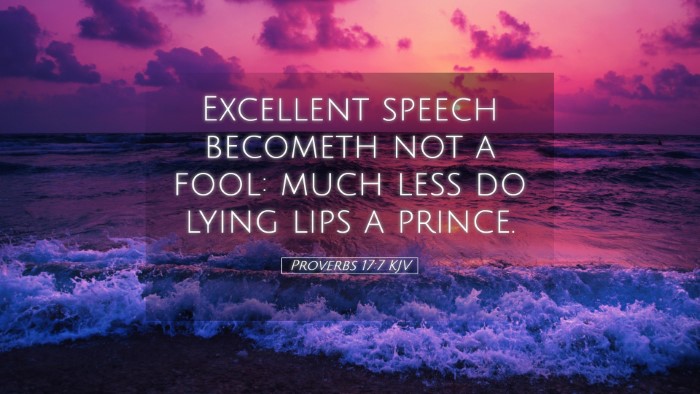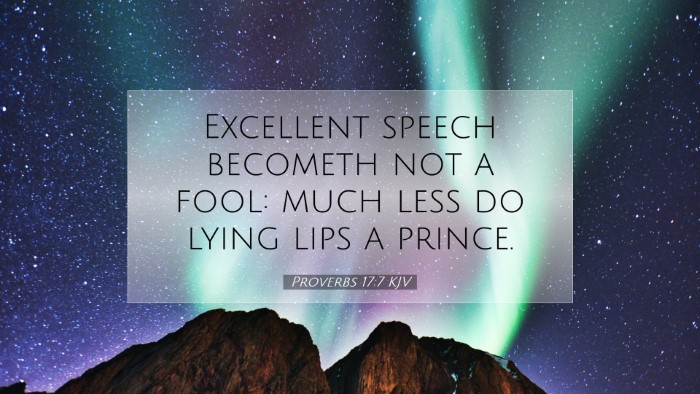Commentary on Proverbs 17:7
Text of Proverbs 17:7 (KJV): "Excellent speech becometh not a fool: much less do lying lips a prince."
Introduction
This verse from Proverbs serves as a profound statement regarding the standards of speech, particularly contrasting the speech of fools with that of those in positions of honor, such as princes. This commentary explores the depth of the verse, drawing from insights of public domain commentaries including Matthew Henry, Albert Barnes, and Adam Clarke.
Understanding the Text
The verse contains two key judgments concerning speech:
- First Judgment: "Excellent speech becometh not a fool."
- Second Judgment: "Much less do lying lips a prince."
1. Excellent Speech and the Fool
Matthew Henry emphasizes that excellent speech, characterized by wisdom and grace, should not be found among fools. A fool, according to Proverbs, lacks understanding and moral soundness, making their speech unsuitable for the high calling of wisdom.
Henry further elaborates that fools often lack the ability to comprehend, apply, or articulate profound truths effectively. Thus, when they attempt to speak with excellence, the result is disjointed, confusing, or even harmful communication.
2. Lying Lips and Princes
Albert Barnes focuses on the second part of the verse, suggesting that lying is utterly unbecoming of a prince. In ancient Israel, a prince symbolizes authority and leadership. Consequently, honesty and integrity are paramount traits for one in authority.
Barnes argues that although princes may be tempted to use deceit for personal gain or political maneuvering, such actions betray their office. The expectations for leaders are markedly higher, as they are called to represent justice and truth.
3. The Relationship Between Speech and Character
Adam Clarke provides an insightful observation on the intrinsic relationship between speech and character. Clarke asserts that the speech of an individual reflects their inner moral and intellectual disposition. Excellent speech signifies wisdom, while foolish speech unveils a lack of understanding.
Clarke posits that the contrast in the verse serves to highlight the distinction between those who are wise and those who are foolish and deceptive. In this way, it speaks not only of the individuals' actions but of their identities as well.
Thematic Insights
This verse illustrates several key themes:
- The Value of Wisdom: Speech is a reflection of one's wisdom or lack thereof. Wise individuals are recognized by their ability to communicate effectively and truthfully.
- The Consequence of Foolishness: Fools will invariably produce speech that lacks substance and virtue, leading to misunderstandings or folly.
- Authority and Integrity: Those in leadership are held to a higher standard, and their ability to communicate truthfully is critical to maintaining their credibility and authority.
Practical Applications
For pastors, students, and scholars, Proverbs 17:7 doesn’t merely serve as a moral directive but also as a nuanced study into the implications of speech. Here are some practical applications:
- Preaching and Teaching: Ensure that your messages reflect truth and wisdom, avoiding any form of deception or misleading rhetoric.
- Personal Conduct: Regularly assess your own speech patterns to ensure they align with godly wisdom, particularly in leadership roles.
- Community Engagement: Foster an environment where honest and open communication is valued, mitigating the risk of foolish or deceitful speech.
Conclusion
The insights provided by these commentaries highlight the weightiness of words and the moral responsibilities inherent in speech, especially for those in authority. Proverbs 17:7 serves as a timeless reminder that excellence in communication is not just beneficial but essential for those who would aspire to be wise and honorable.


